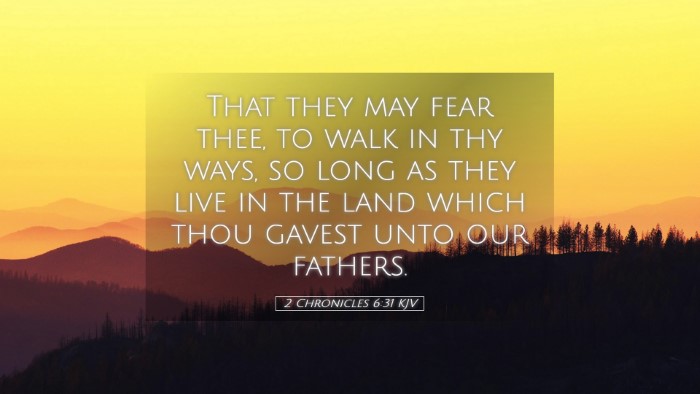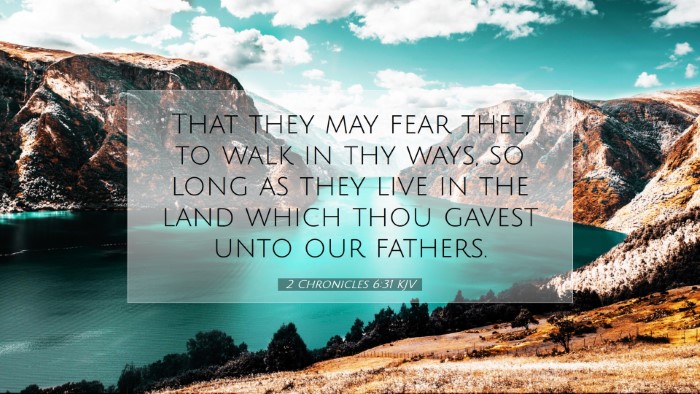Commentary on 2 Chronicles 6:31
Verse Context:
2 Chronicles 6:31 states, "That they may fear thee, to walk in thy ways, so long as they live in the land which thou gavest unto our fathers.” This verse occurs within Solomon's prayer during the temple's dedication, where he intercedes for the people of Israel.
Exegesis and Theological Themes
The opening of this verse serves as the culmination of Solomon's supplication, reflecting the critical themes of reverence, obedience, and the covenant relationship between God and His people.
Fear of the Lord
Matthew Henry's Insights:
Henry notes that the "fear of thee" represents a profound reverence for God's holiness, leading to a life reflecting His righteousness. This fear is characterized by awe and a recognition of His omnipotence and justice.
Albert Barnes' Elaborations:
Barnes emphasizes that the phrase indicates a desire for a deep, abiding respect towards God that manifests itself not only as fear but as love and loyalty. The fear of God, according to Barnes, is essential for a flourishing relationship between the believer and the Divine.
Walking in His Ways
Adam Clarke's Commentary:
Clarke articulates that "to walk in thy ways" signifies adherence to God's commands and a commitment to live according to His decrees. This obedience is portrayed as a responsive act stemming from an understanding of God's character and expectations.
Practical Implications for Believers
- Holistic Obedience: The believer is encouraged to pursue a lifestyle marked by obedience to God's teachings, reflecting integrity in both public and private spheres.
- Transformation through Reverence: The text invites introspection about one's fear of God, urging believers to cultivate a relationship that is fearfully reverent yet lovingly obedient.
- Community Impact: As Solomon prays for the people, so too should contemporary believers prioritize prayer for their communities, fostering environments where reverence for God is shared and nurtured.
The Promise of Land and Heritage
The latter part of the verse speaks of walking in God’s ways "so long as they live in the land which thou gavest unto our fathers." This signifies both a historical and a future promise that hinges on obedience.
Loyalty to the Covenant
Matthew Henry: Henry elucidates that the land is a tangible sign of God's covenant—a reminder of His faithfulness that requires the people’s faithful response.
Albert Barnes: Barnes postulates that the gift of the land comes with the expectation of fidelity to God's commands. Failure to maintain this loyalty would jeopardize their possession of the land.
The Role of Prayer in Covenant Faithfulness
- Continual Supplication: The imagery of prayer in the dedication context emphasizes that communication with God is vital in upholding the covenant relationship.
- Intercession for Generations: Solomon’s prayer becomes a model for interceding on behalf of future generations, ensuring that they remain aligned with God’s purposes.
- Collective Responsibility: The notion of a community fearing God and walking in His ways reflects a collective responsibility in nurturing faith within families and congregations.
Conclusion: Living in Reverence
2 Chronicles 6:31 encapsulates the essential call for believers to live in reverent obedience before God. The verse not only calls forth a heartfelt fear of the Lord but also outlines a blueprint for a life devoted to walking in His ways, rooted in the recognition of His goodness and the weight of His covenant commitments.
Understanding this verse requires a holistic approach that incorporates personal transformation through reverence, communal prayer, and a commitment to the faith upheld through generations. Wisdom and understanding derived from such comments can encourage pastors, students, and theologians as they engage with the text and its implications for their own walks of faith.


